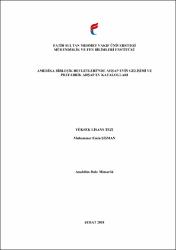Amerika Birleşik Devletleri’nde ahşap evin gelişimi ve prefabrik ahşap ev katalogları
Citation
ŞİŞMAN, Muhammet Emin, Amerika Birleşik Devletleri’nde ahşap evin gelişimi ve prefabrik ahşap ev katalogları, Fatih Sultan Mehmet Vakıf Üniversitesi Mühendislik ve Fen Bilimleri Enstitüsü Mimarlık Anabilim Dalı, Yayımlanmamış Yüksek Lisans Tezi, 2018Abstract
Bu tezde, Türkiye’de güçlü bir tarihsel arka planı olmasına rağmen günümüzde son
derece düşük oranlarda inşa edilir hale gelen ahşap konut mimarisi literatürüne katkı
sağlamak amacıyla, Amerika Birleşik Devletleri’nde yaygın bir şekilde kullanılan
ahşap evin teknik gelişimi ve özellikle endüstrileşme süreci incelenmektedir.
İki aşamadan oluşan çalışmada öncelikle Amerika’da kolonyal dönemden belirli bir
olgunluğa eriştiği II. Dünya Savaşı’na kadarki süreçte, ahşap evin strüktürel anlamda
gelişimi ve endüstrileşmesi araştırılmaktadır. Bu bölümde Amerikan ahşap ev
mimarisinin kökenlerini oluşturan yerel toplulukların üretimi ve Avrupa
kolonilerinin konut mimarilerinin yapısal özellikleri ile yeni kurulan bir ülke olarak
ABD’nin ev mimarisinin temelinde yatan ekonomik, sosyal ve kültürel zeminler ele
alınmaktadır. Ayrıca, ahşap evin endüstriyel üretim tekniklerine uygun olarak
gelişimi ve standardizasyonu ile prefabrik ahşap evlerin ortaya çıkışı ve
yaygınlaşmasına zemin hazırlayan şartlara değinilmektedir.
Tezin sonraki aşamasında ABD’deki ahşap ev inşa faaliyetlerinin gelişiminin
incelenmesi için en temel ve uygun kaynak olan prefabrik ahşap ev katalogları
üzerine bir çalışma yapılmıştır. Bu kısımda, ABD’de ahşap ev mimarisine dair geniş
ve zengin literatür özelliği taşıyan prefabrik ahşap ev katalogları ve bunlara zemin
hazırlayan mimari yayınlar değerlendirilmekte ve örnek yayınlar üzerinden
detaylandırılmaktadır. Prefabrik ahşap ev endüstrisinin seyrinin kapsamlı bir şekilde
aktarılabilmesi amacıyla sektörün kurucu ve lider firmalarının farklı dönemlerde
yayınladığı 3 katalog derinlemesine incelenmektedir. Bu kataloglar E. F. Hodgson
firmasının ‘Hodgson Portable Houses’ (1908) kataloğu, Aladdin firmasının ‘Aladdin
Homes’ (1920) kataloğu ve Sears & Roebuck Co. (Sears) firmasının ‘Honor Built
Modern Homes’ (1928) kataloğudur.
Çalışmanın sonucunda, ABD’de mevcut olan ahşap ev geleneğinin endüstrileşme
süreci sonrasında da yeni üretim ve pazarlama tekniklerine uyum sağlayarak devam
ettiği görülmektedir. 20. yüzyılın başlarında ahşap evler prefabrik yöntemlerle
üretilmekte ve kataloglar vasıtasıyla satılmaktadır. ABD’de yaygın olan katalogla
alışveriş kültürünün konut sektörüne yansıması olan bu sisteme postayla sipariş ev
(mail-order house) denilmektedir. Prefabrik yöntemlerle üretilmesi sonucu uygun
fiyatlarla satılan ahşap evler; demiryolu ağının genişliği, postayla sipariş ev sistemi
ve devlet politikaları sayesinde ülke çapında yayılmıştır. In this thesis, technical development and turning points of “timber house” which
have been used commonly in the United States of America is examined. Especially,
the prefabricated timber house systems that had been developed during the country’s
industrialization process are held in detail.
The theme of this study draws from a contrasting observation concerning Turkish
architectural tradition. Although Turkish architectural history had a widespread
timber house background, nowadays it is preferred in slightly low percentages. So
this study aims to make a humble contribution to the field of domestic timber
architecture studies in Turkey by means of giving different country experiences. For
this reason USA is chosen as the example model, and the structural and technical
development of wooden house and its industrialization process in USA are held in
detail from the colonial times to the World War II period.
Since USA is a recently built country, in order to wisely evaluate the foundations of
economic cultural and social dynamics behind the American house architecture,
firstly the structural features of domestic architecture of both the indigenous people,
i.e. the Indians and the colonial people are examined in detail.
Secondly, the development of timber house in accordance with the industrial
production techniques and its standardization are held. Besides, the emergence of
prefabricated timber houses and the conditions paving the way for their proliferation
are mentioned briefly.
The other weighted part of the study consists of the catalogues prepared for the
“mail-order houses” which are accepted as fundamental and the most relevant
sources for the study of American timber house. In this section, the development of
prefabricated timber house catalogues and other architectural publications that
provided the basis for them are critically evaluated by examining three of them in
detail.In order to be able to convey the process of prefabricated timber house
industry thoroughly and comprehensively, the catalogues published by the founding
and leader firms of the mail order house sector are chosen. The publications analyzed
are namely E. F. Hodgson’s 1908, Aladdin’s 1920, and Sears & Roebuck Co.
(Sears)’s 1928 catalog.
As a result of the thesis, it is found that the tradition of timber house in the USA have
kept its existence by way of getting through a process of adaptation to new
production and marketing techniques that came to fore in the Industrial age. At the
beginning of 20th century, wooden houses were produced by using prefabricated
methods and sold by means of catalogues. This system is a reflective example of a
general culture –i.e. shopping through catalogues- and called mail-order house. These wooden houses which were cheap due to their prefabricated production
techniques, had a widespread usage in country level. It should be noted that the
railway system and mail order house system have also supported this extensive
usage.



















